
The Kingdom of The Past
- Thread starter Mithridates_VI
- Start date
-
We have updated our Community Code of Conduct. Please read through the new rules for the forum that are an integral part of Paradox Interactive’s User Agreement.
You are using an out of date browser. It may not display this or other websites correctly.
You should upgrade or use an alternative browser.
You should upgrade or use an alternative browser.
Well at least you have a stable succesion.Long live Mithridatir IV.
And long he will live!
Your realms borders seem to have started to stabilise - at what borders they are!
Oh, thank you.
They seem to like that name. Here's hoping they keep it up for awhile.
Yeah, it's nice name
Mithridatir IV "the Magnanimous" Pontian
Lived: 1039-1104
Ruler of Kiev: 1063-1104
King of Kievan Pontus: 1063-1104
Roman Emperor: 1063-1079
Lived: 1039-1104
Ruler of Kiev: 1063-1104
King of Kievan Pontus: 1063-1104
Roman Emperor: 1063-1079
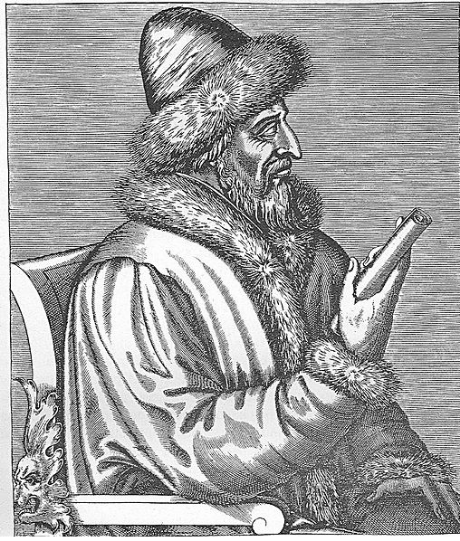
Mithridatir IV inherited the Kingdom of Kievan Pontus in 1063. During the Mithridatir IV's reign union with Kievan Pontus and Byzantine Empire begun. The consequences of the union were significant to Kievan history.
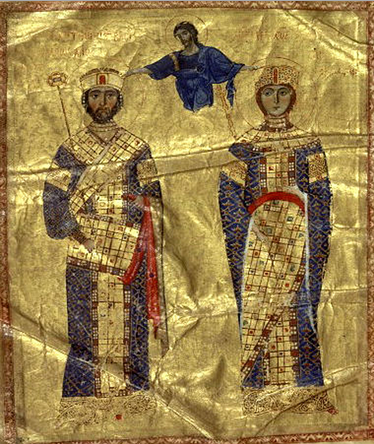
Mithridatir IV and Empress Anastasia.
Kievan armies continued war against Pomeranians. However Mithridatir IV was forced to withdraw armies from Pomerania when Vsevolod Iziaslavich, bastard member of Pontian dynasty, declared coup against Mithridatir IV in 1065.
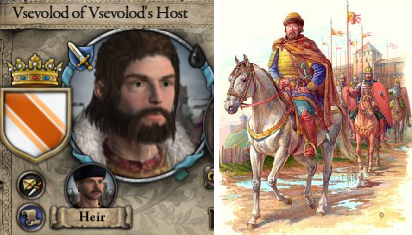
Vsevolod Iziaslavich.
Pomeranian campaign was failed but now Mithridatir IV was able to concentrate on war against Vsevolod. Kievan troops were able to defeat Vsevolod's troops in series of battles and finally Vsevolod was captured and jailed.
Mithridatir IV joined war with his wife after Byzantine Empire had declared war against Sunni Caliph. Even though Mithridatir IV sent his army to Anatolia, Kievan assistance had only a small influence on the war. Kievan troops were able to besiege couple of cities which was however very small deed in comparison with performance of Byzantium troops. Caliph was beaten after a few years of war.
Heretic movement of Catharism started appearing in Kievan Pontus and got foothold in Lyubech in 1073. Mithridatir IV launched countermeasures to eliminate heretic movement. Thanks to these acts, Catharism was suppressed. Even though Catharism had still some support with people, it was mostly gone.
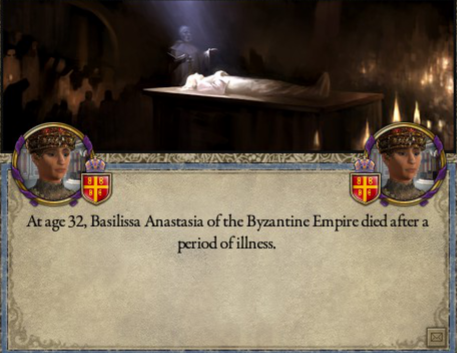
After his wife death, Mithridatir IV married daughter of King of Aquitaine but this marriage didn't take long. After three years, She died in carriage accident. Some have said that Mithridatir IV was himself behind this accident which had been justified with arguments that it was known that Mithridatir IV was not satisfied with the marriage and accused his wife of cheating and Mithridatir IV had even asked divorce from Pope who had denied it. Mithridatir IV was also earlier accused of poisoning attempt of his wife. After the death of his second wife, Mithridatir IV married one of his lover who was also his kinswoman.
Mithridatir IV joined to assist Byzantine Empire in many wars, which Regency of Byzantine were really eager to declare. Mithridatir IV continued helping the Byzantine in wars when Alexander became an adult. Kievan nobles were not eager about the fact that their levies were used in wars that weren't really relevant to Kievan Pontus. Some of the Nobles started to think that Mithridatir IV had too much power over them and started plan to rebellion.
Finally after Alexander and Mithridatir IV had won the war for Coloneia some of the Kievan nobles sent letter to Mithridatir IV to force him lower his authority. They thought that Mithridatir IV wasn't enough mentally stable to have that much power. Mithridatir IV denied their proposal and this forced them to take up arms against crown.
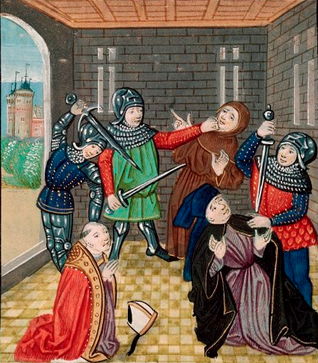
Rebels executing clergymen who were supporting Mithridatir IV.
However Mithridatir IV managed to win important battles and decimate rebellion troops and after couple of years fighting Mithridatir IV forced rebellion to surrender. Mithridatir IV imprisoned all rebellious vassals and sent his armies to east which was under the threat of armies of Yabguid.
Kievan armies were able to defeat armies of Yabguid and even Khan Erdem II was killed in battle. After four years new Khan realised that victory was unattainable and he was forced to surrender in 1096.
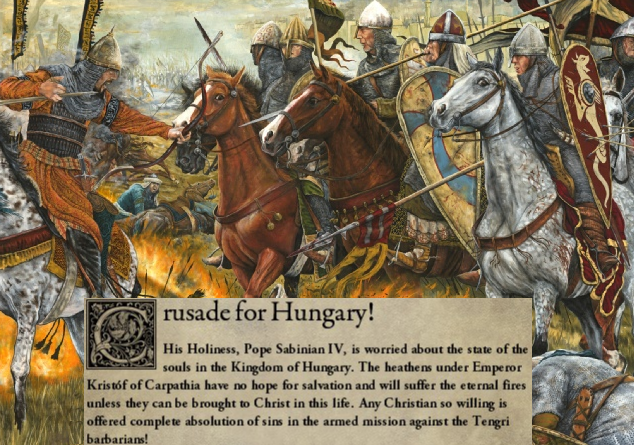
Deus vult!
Pope Sabinian IV had decided to bring down this powerful pagan empire and launched large scale Christian holy war against it. This war had been known as First Crusade.
Originally Mithridatir IV was not going to join the crusade but after seeing that Chistian forces were not able to beat Hungarians he accepted the decision to join. Mithridatir IV raised large army which consisted Kievan troops and a large amount of mercenaries. He took this army to Hungary where large Hungarian army was defeating Crusaders. In Battle of Ostrava, Mithridatir IV's army was able to beat Hungarian army which changed course of Crusade. However Mithridatir IV was unable to join this battle because he injured after falling off a horse during the march to Hungary. Soon Mithridatir IV's wound healed and he was able to go back and join fighting. Crusaders besieged Hungarian cities and whole Carpathia was a large war zone. Some can say that it was just bad luck but in the last battle of Crusade, Mithridatir IV was maimed. However Crusade was won in 1103 and Pope decided to give land of Hungary to Mithridatir IV because it was seen that Kievan Pontus had had major impact in Crusade.
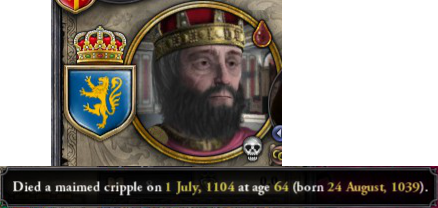
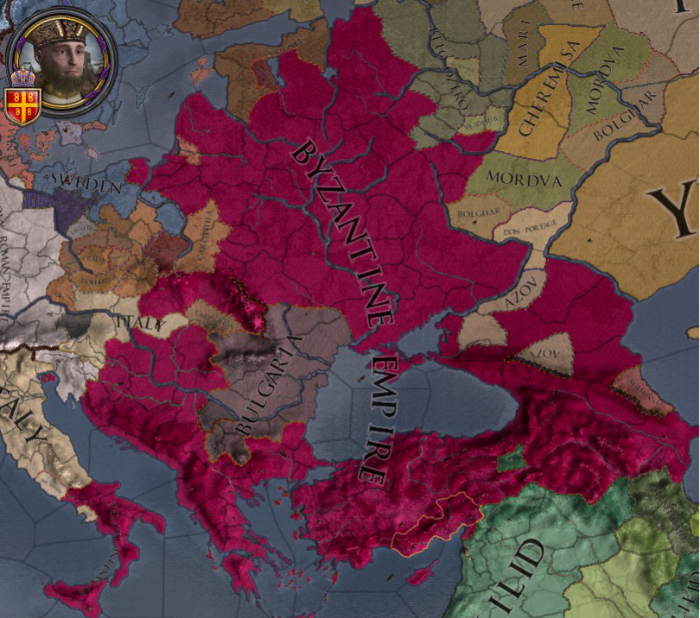
Realm of Kiev during the death of Mithridatir IV.
And thus Black Sea became your inner lake. How hard would it be to peacefully incorporate Bulgaria via royal marriage? Also are you planning some partition of empire? I imagine Greeks aren't happy with northern barbarian rule, while Pontians probably detest decadent Greeks, there's gonna be blood.
And thus Black Sea became your inner lake. How hard would it be to peacefully incorporate Bulgaria via royal marriage? Also are you planning some partition of empire? I imagine Greeks aren't happy with northern barbarian rule, while Pontians probably detest decadent Greeks, there's gonna be blood.
No idea how easy would be to peacefully incorporate Bulgaria. One would think that it would be easier than whole Byzantine Empire but that's not always that way. I like the idea of partition because I'm not really into to have too big blob. I would have to figure out how it could happen first. And yeah there can be problem with Greeks and Pontians but bigger issue is Feudal vassals that aren't not really happy about Imperial administration and viceroys.
Fighting to keep the nation intact will be difficult indeed. Truth be told, I wouldn't mind seeing an all out rebellion and you starting small again but I guess partition would work as well.
Fighting to keep the nation intact will be difficult indeed. Truth be told, I wouldn't mind seeing an all out rebellion and you starting small again but I guess partition would work as well.
That was heartening
Alexander "the Great" Pontian
Lived: 1067-1120
Ruler of Kiev: 1104-1120
King of Kievan Pontus: 1104-1120
Roman Emperor: 1079-1120
Lived: 1067-1120
Ruler of Kiev: 1104-1120
King of Kievan Pontus: 1104-1120
Roman Emperor: 1079-1120
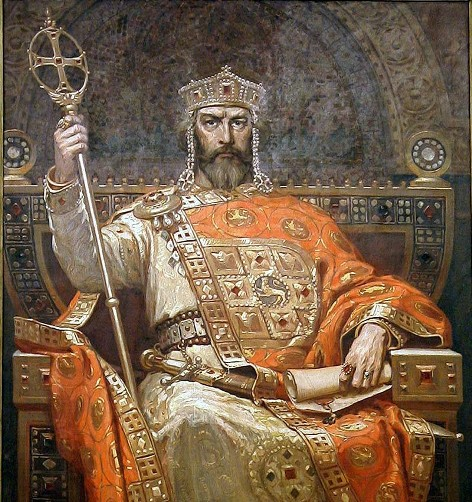
Alexander was first Pontian Emperor and after inheriting Kievan Pontus he was known as the most powerful man in known world. Even though Alexander's reign had big effects to Kievan Pontus, it also changed Byzantine Empire radically. Especially changes in religious politics were big. Ecumenical Patriarch was ousted and Empire started follow Western Christianity, Catholicism.
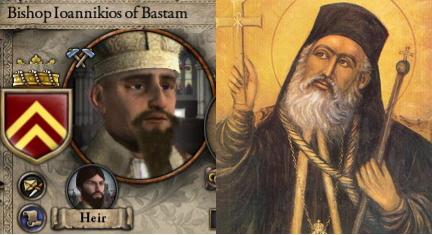
Bishop Ioannikios of Bastam.
The fact that Alexander was follower of Western Christianity facilitated the start of the reformation, especially when Ioannikios wanted bring the church of Empire to the Western Church. Pope saw this as good thing and supported Ioannikios reforms.
Governos were asked to convert but if they wanted to stay in Eastern Church they were allowed to do that. However only those who converted had chance got higher office. This helped conversion and especially when Eastern and Western Church looked the same to the common people, also population started conversion.
When Alexander grew up he took charge but Ioannikios had still great influence to politics. He was announced as Eastern Pope which in turn angered Pope. Ioannikios prompted Alexander to attack against Sunni state of Armenia which lost to Byzantine Empire quickly.
Alexander's early reign was struggle against his administration which saw him as an foreigner. In response to this Alexander started favoring Kievan nobles to whom he gave the highest positions. This was start to "Kievfication" of Byzantine Empire. There were lot of outrage among the Greek nobles but Imperial army suppressed all plans to rebellion.
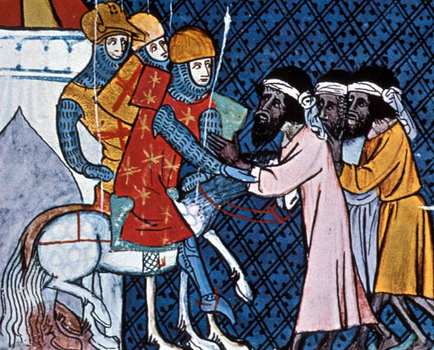
Diplomats of Caliph accepting the victory of Alexander.
Warfare had burdened his father's vassals too much which resulted revolt in Kievan Pontus. Alexander had decided to join help his father but, mostly for the same reason, civil war started also in Byzantine Empire. Nobles who started civil war had underestimated the power of Alexander and because of that they were utterly crushed.
When First Crusade started Byzantine Empire and Rome were still angry to each other because Alexander had announced that Ioannikios is Eastern Pope. Therefore Alexander had no desire to help Pope in his holy war. Even though he didn't like Alexander, Pope never threatened Alexander with excommunication or equivalent because Alexander had good relations with other big Christian realms.
Because Alexander didn't join the Crusade he was able to raise part of his army and sent them to Iberia where King of Asturia, Alexander's nephew, was facing revolt and asked help. Asturian revolt had no chance against Imperial army which had a much larger number of troops.
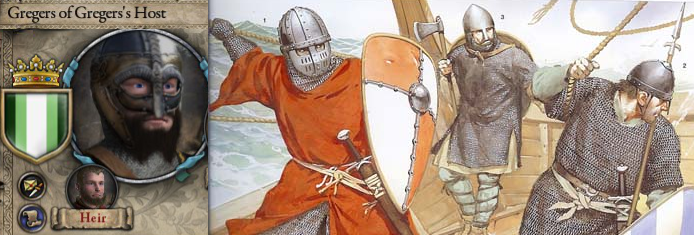
Danish invaders.
This unofficial Crusade against Byzantine Empire was at first successful. Gregers armies defeated couple of Imperial armies which was big blow to Alexander. However Byzantine Empire had a bigger number of men and Gregers was beaten.The last remain of troops were defeated ultimately in 1104.
Alexander had to go back to Kiev where he was crowned to be King of Kievan Pontus after his father had died. Kievan nobles were little bit concern because in their view, Kievan Pontus had lost its independence due to the fact that now power was held in Constantinople. Also there was concern about that Kievan nobles would loose their hereditary titles and those would be replaced with non-heritable governorships.
Mostly concerns about losing hereditary titles was unnecessary because Alexander was not interested to change organization of Kievan Pontus and it was, for the most part,managed like before his reign.
Large realm with many direct vassals and governors was difficult task, and because Alexander was not going to change organization of Kievan Pontus, he was forced to split lands of Empire to larger regions. For example Balkans were splitted between two Viceroy: Viceroy of Croatia and Viceroy of Serbia.
After inheriting the Kievan Pontus, Alexander had a lot of power in his hands. Ioannikios was deposed from power and in 1107 Alexander appointed new Eastern Pope called as John Paul. Alexander had now the real religious power in Empire.
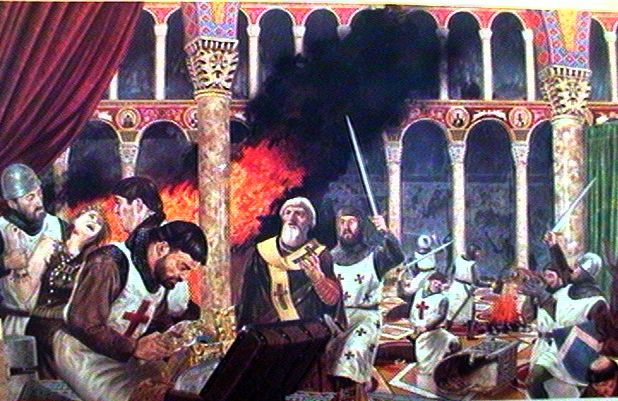
The raid of Bishopric of Constantinople.
In 1113 Alexander faced another civil war when Minor Vicereine of Aegean Islands claimed to be new Emperor. She was able to get many Kievan Nobles, who had really never been happy about being under the power of Byzantine Empire, to join in against Alexander. Alexander's loyal troops marched to north where they confronted the largest resistance. Varangian guard was put in charge to defeat rebellion in Greece.
After two years of war, the last rebel armies were defeated. Minor Vicereine and many other highly placed, who were in rebellion, were imprisoned. All administrative titles were revoked from them but some of the Kievan Nobles were allowed to keep all their titles.
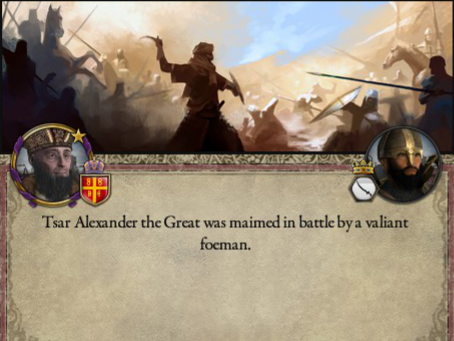
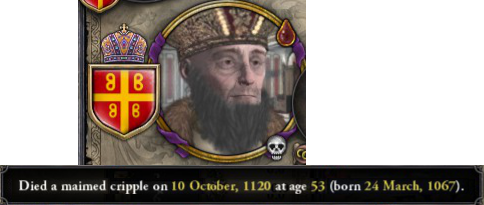
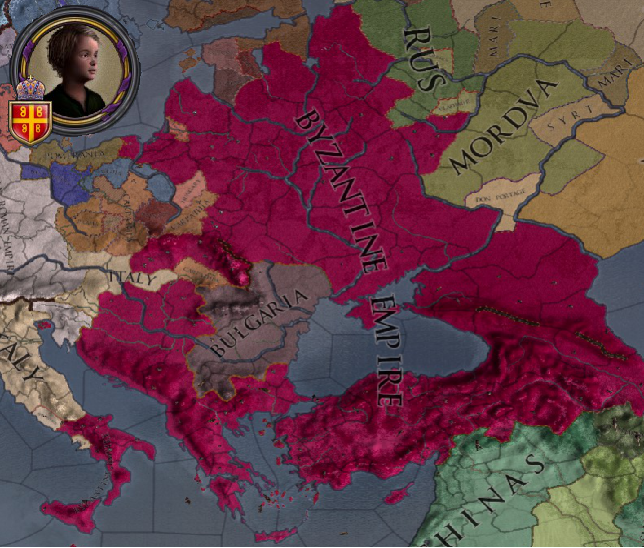
Pontian Empire during the death of Alexander.
Underage ruler? Sounds like the perfect moment for more rebellions. Looks like it may take many more years before those disloyal to the empire could be completely rooted out.
Glad to see that Alexander managed to hold his empire together. I fear Diomedes will find the task a little more troublesome, however, particularly in an empire still riven by religious strife and cultural differences. That said, unless there's still a strong Caliphate in the south, I doubt any other secular power could really pose much of a threat to Byzantine power or check their expansion if they do manage to hold together.
Glad to see that Alexander managed to hold his empire together. I fear Diomedes will find the task a little more troublesome, however, particularly in an empire still riven by religious strife and cultural differences. That said, unless there's still a strong Caliphate in the south, I doubt any other secular power could really pose much of a threat to Byzantine power or check their expansion if they do manage to hold together.
Caliph is still strong fellow. We are almost same strong.
Diomedes II "the Pious" Pontian
Lived: 1117-1168
Ruler of Kiev: 1120-1162
King of Kievan Pontus: 1120-1168
King of Jerusalem: 1138
Roman Emperor: 1120-1168
Lived: 1117-1168
Ruler of Kiev: 1120-1162
King of Kievan Pontus: 1120-1168
King of Jerusalem: 1138
Roman Emperor: 1120-1168
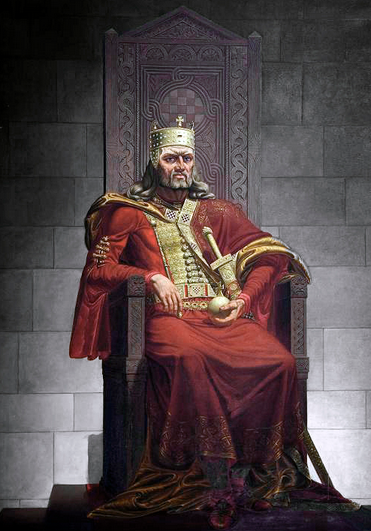
Diomedes II was King of Kievan Pontus and Emperor of Byzantine Empire almost half century after he inherited the crown in 1120. During the reign of Diomedes II Christianity became more united which led to the Crusade for Jerusalem. Even though Diomedes II continued his father's feud with Pope and continued keeping own Eastern Pope, he allied with Pope during the Crusade.
Diomedes II saw foreign relations important and gave a lot of support to proselytizing and thanks to him Rus, Sweden and Carpathian Empire were converted to Catholicism. Diomedes II even married daughter of Khan of Yabguid Khanate, which had been the long-time rival of Kievan Pontus. The relations of two dynasties had improved when Yabguid Khanate converted to Catholicism during the reign of Alexander.
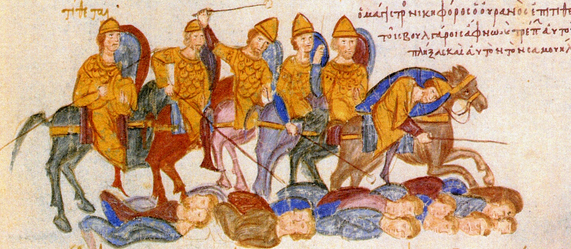
Rebel Cavalrymen.
The rebelling faction underestimated the abilities of regency which had skilled military leaders and wasn't able to get the upper hand in the rebellion. When personal army of Grand Prince of Nikaea was destroyed there were no more chance to rebellion to succeed.
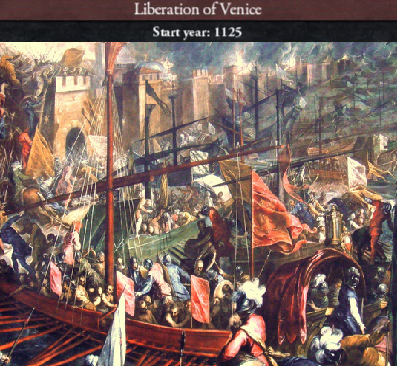
Siege of Venice
Regency of Diomedes II raised an army to defeat the revolt. Army, leaded by Varangian Guards, tried to make landing to Venice but rebels defeated it completely. Defeat was crying shame to regency which wasn't eager to launch another attack anymore. Also the fact that group of Turkestan warriors had started invasion to eastern parts of Empire was reason that Venetian revolt was allowed to operate more freely. Imperial army was able to defeat invasion but Venice was lost. Empire was forced to admit defeat and Venetian Paulicians were given independence.
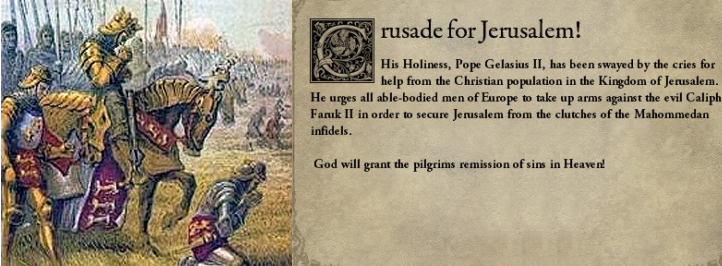
Diomedes II in Crusade.
During the Crusade two Christian military orders, Knights Templars and Knights Hospitallers, were founded. These orders were founded to secure pilgrims which would made pilgrimage to the Holy Land. Both orders were also important factors during the battles in Crusade.
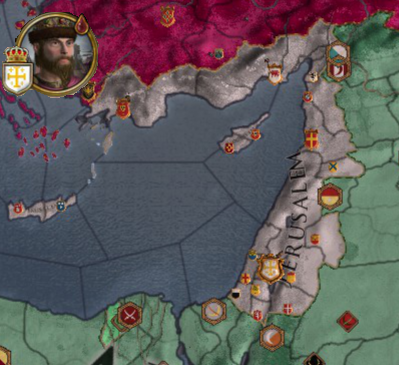
Kingdom of Jerusalem.
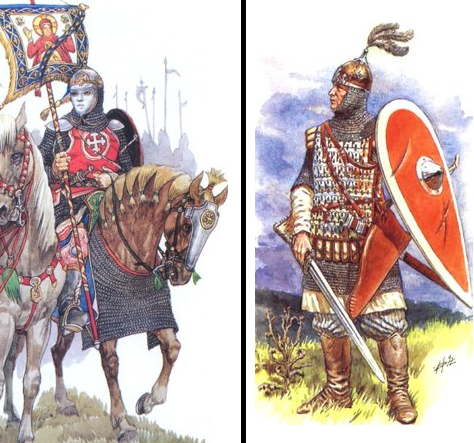
Cavalryman and infantryman of Imperial Guard.
There were still only a little support to Diomedes among the Kievan Nobles which saw him as an outsider which can be justified by the fact Diomedes II spent very little time in Kievan Pontus. However Diomedes II also developed Kievan Pontus and started populate more area in Kievan Pontus by establishing new cities and baronies. Even though Constantinople was the center of Empire, Kiev as well prospered, and grew more monumental city.
Finally in 1147 new rebellion against Diomedes II was launched by Grand Prince of Nyitra. Rebels were able to defeat Diomedes II's troops in Kievan Pontus but, after beating rebels in Greece, Imperial army marched towards center of rebellion in the north and defeated all armies of the rebellion. Eventually rebellion was forced to surrender in 1149.
Muslim world was outraged about fact that Holy Land was lost to Christians and to respond to this Sunni Caliph called Jihad against Kingdom of Jerusalem in 1152. King of Jerusalem, King Alexander, gave the leadership of defending to Diomedes II who brought armies from all over the Empire to the Holy Land. A large number of Christian rulers offered their help against Caliph and Diomedes II was more than glad to receive their help.
Caliph hadn't expected this kind of defensive coalition by Christians which gave Diomedes II and Christians upper hand against Caliph. Especially when Diomedes II faced army of Caliph in Sarmin, it was victory to Diomedes II thanks to Italian army which was able to slow down second army of Caliph so that it wasn't able to join help. Caliph was finally defeated and he called off Jihad in 1154.
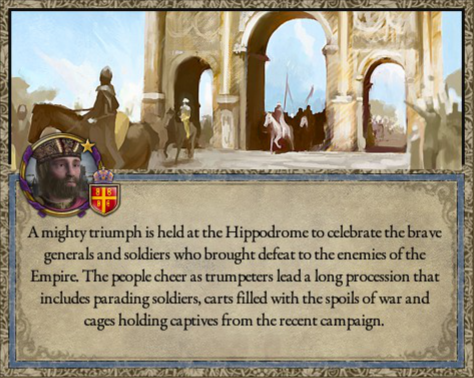
However soon Diomedes II's nephew, Roman Sigfredovich, became envious to Diomedes II and tried to launch coup. Roman gathered large group of warriors to join him and attacked to Constantinople. Roman's warriors however were inferior to Imperial troops which destroyed them in 1161.
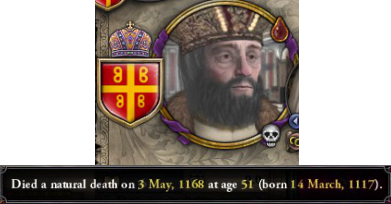
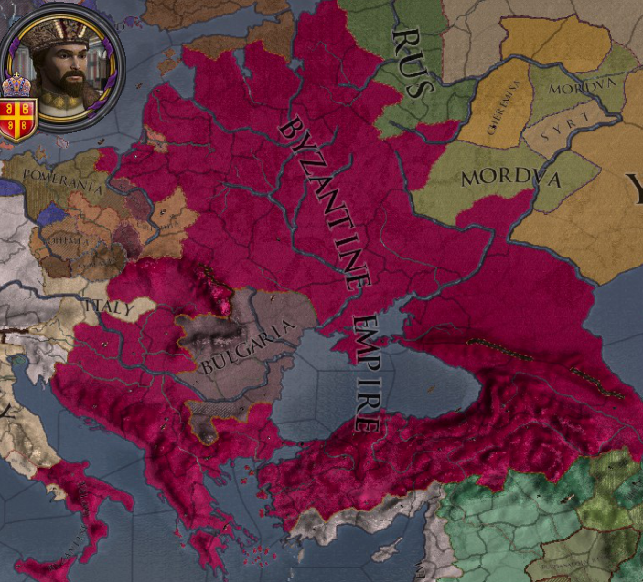
Pontian Empire during the death of Diomedes II
That was quite a reign. The loss of Venice is kind of bad but his overall successes, especially against the Caliph, has been numerous. So, which direction will the empire expand to next?
That was quite a reign. The loss of Venice is kind of bad but his overall successes, especially against the Caliph, has been numerous. So, which direction will the empire expand to next?
Yeah, lost of Venice was sad thing. About expansion, we will see. Nothing big. Lands of Caliph are always good direction because they are the biggest threat.
Julian "the Fat" Pontian
Lived: 1141-1208
Ruler of Kiev: 1162-1202
King of Kievan Pontus: 1168-1208
Roman Emperor: 1168-1208
Lived: 1141-1208
Ruler of Kiev: 1162-1202
King of Kievan Pontus: 1168-1208
Roman Emperor: 1168-1208
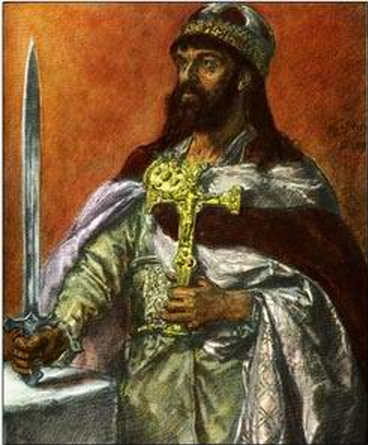
Julian was Emperor forty years and he wasn't man with great talents. He was seen as gluttonous and greedy man who was too craven to command armies himself. Most notable act during his reign was his decision to increase the influence in the Baltic Sea by establishing a Republic of Livonia.
Julian's father, Diomedes II, gave title Ruler of Kiev to Julian in 1162. During this time, Julian didn't make any significant changes in Kiev and after the death of his father, Julian returned back to Constantinople.
When Julian rose to power he faced a lot of resistance. Civil war erupted almost immediately after coronation. Some of the Nobles didn't accept the fact that Julian was chosen to be Emperor and they wanted to replace him. Imperial army was sent to defeat rebellion armies which had made good progress in Servia. Rebellion army was defeated which was big setback to rebellion which had the shortage of manpower. In 1170 Julian was able to imprison leaders of rebellion which finally ended civil war.
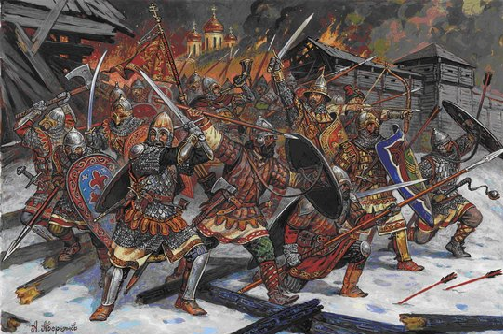
Imperial army attacking to Bornholm.
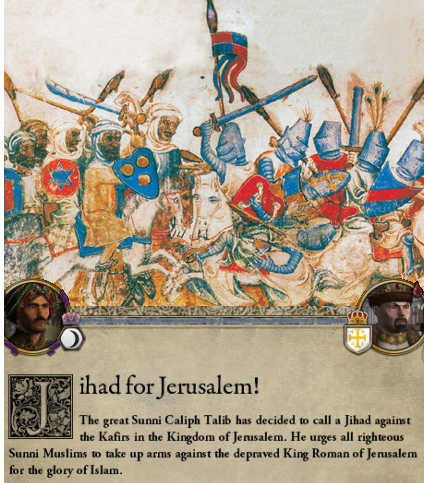
Second Jihad.
Julian needed to move his armies to Armenia to defeat Simeon's armies. Simeon was surprised by the fact how fast Julian was able to move his armies from Jerusalem to Armenia which more or less proved to be her downfall. Simeon was defeated and Julian brought his armies back to Jerusalem. Muslims hadn't been able to take advantage of the civil war and in 1191 Jihad was canceled as failure.
Julian didn't consider the peace treaty with Caliph as sufficient and declared new war against Sunni Caliph. Already weakened by failed Jihad, Sunni Caliph wasn't able to defend and was forced to give Jazira to Julian in 1197.
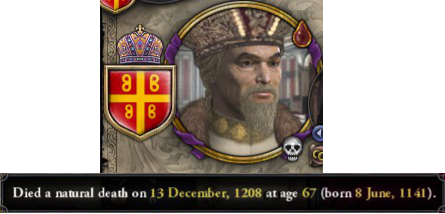
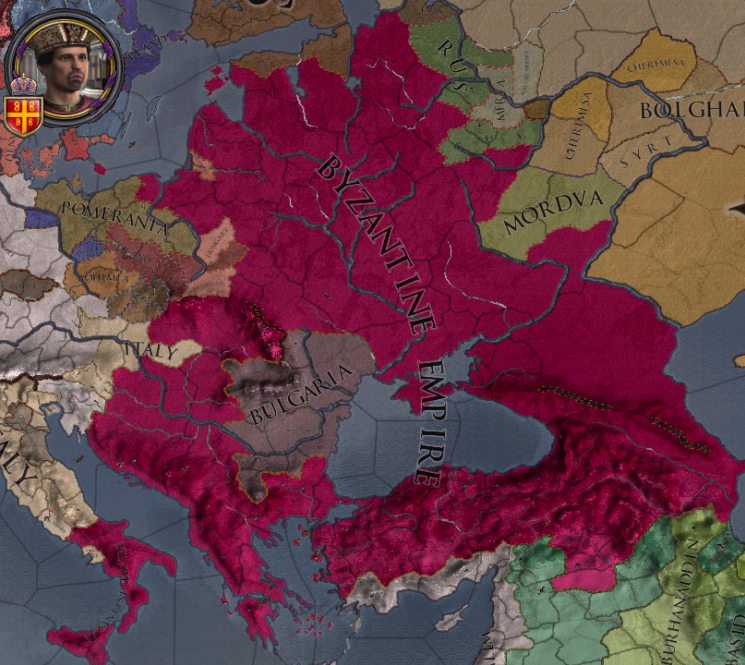
Pontian Empire during the death of Julian
What a game! Have you properly feudalized everything yet?
Thanks! And yes everything is properly feudalized (even though there is still a lot of counties which don't consist more than primary holding)
The civil wars must be a pain to handle given that they drain your resources. Might take awhile to stabilize but, at the moment, no one seemed to be really in a position to challenge you. I guess we have to wait for the Mongols then.

